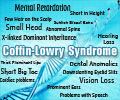People without mental illness prescribed psychotropic medications such as antipsychotics can have side effects like sedation, weight gain and restlessness.

When people without mental illness are prescribed psychotropic drugs, such as antipsychotics, which is given for people with schizophrenia or bipolar disorder, it is probably to control their behavior, said the study’s authors, from University College London (UCL).
“I think there’s been concern for a long time that psychotropic medications are being overused in people with intellectual disabilities,” said Rory Sheehan, an academic clinical fellow at UCL and lead author of the paper.
Sheehan and his team members were concerned, as it is difficult to justify the use of strong drugs such as antipsychotics that can have side effects, except in specific circumstances.
“You wouldn’t want to give these medications without quite strong justification,” he said.
Some people are given such drugs for very good reasons. The researchers found that of 9,135 people in their study with intellectual disabilities and treated with antipsychotic drugs, 71% – or 6,503 people – did not have a record of severe mental illness.
Advertisement
Individuals with intellectual disabilities have an IQ below 70 and also have some difficulty in functioning on a day-to-day basis.
Advertisement
Older people with a record of challenging behavior, autism, dementia epilepsy and mental illness, were significantly more likely to be prescribed antipsychotics.
Charities that support older people campaign against the use of antipsychotics to keep those with dementia quiescent.
The researchers also found that drugs to treat anxiety and antidepressants were prescribed frequently.
The study focused on the use of antipsychotics as it causes side effects such as sedation, weight gain and other metabolic changes that can lead to diabetes and movement problems such as restlessness, stiffness and shaking.
“Side effects can be managed, but the risks and benefits must be carefully considered before prescribing antipsychotics to people without severe mental illness,” said Sheehan.
“Research evidence does not support using antipsychotics to manage behaviour problems in people with intellectual disabilities. Many people with intellectual disability and behaviour disturbance have complex needs and other interventions, such as looking at the support people receive and their communication needs, should be prioritized,” he said.
“Antipsychotics, or indeed any medications, should not be prescribed lightly and are no substitute for comprehensive care,” said Sheehan.
The study is published online by The British Medical Journal.
Source-Medindia














